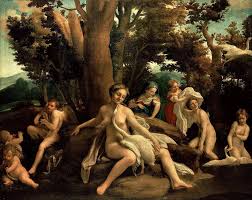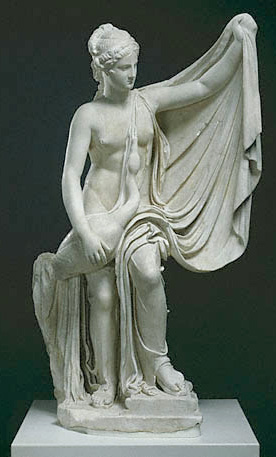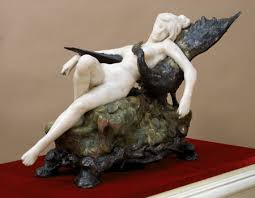If you seek well you shall find.
First secure an independent income, then practice virtue.
The beginning is the half of every action
"It concerns us to know the purpose we seek in life, for then, like archers aiming at a definitive mark, we shall be more likely to attain what we want." (Aristotle)
"Practice yourself, for heaven's sake, in little things; and thence proceed to greater." (Epictetus)
"For where there is love of man, there is also love of art." (Hippocrates)
"Human behavior flows from three main sources: desire, emotion, and knowledge" (Plato)
"Success for the striver washes away the effort of striving." (Pindaros)
"The nearest way to glory is to strive to be what you wish to be thought to be." (Socrates)
"If you are out of trouble, watch for danger." .... "There is no success without hardship." (Sophocles)
- Άτυχος είναι αυτός που δεν μπορεί να υποφέρει την ατυχία (Βίαντας)
- Κακό πράγμα η ανάγκη αλλά δεν είναι ανάγκη να ζει κάποιος δημιουργώντας πολλές ανάγκες (Επίκουρος)
- Αν θέλεις να κάνεις κάποιον πλούσιο, μην του προσθέτεις χρήματα, να του αφαιρείς επιθυμίες (Επίκουρος)
- Τη μοίρα του ανθρώπου την καθορίζει ο χαρακτήρας του (Ηράκλειτος)
- Δύο πράγματα μας βοηθούν να καταλάβουμε τι είναι ο θάνατος: το πώς νοιώθουμε προτού γεννηθούμε και ο βαθύς ύπνος (Αναξαγόρας)
---------------------------
He who is not satisfied with a little is not satisfied with allot
This saying indicates that we should be happy with what we have and appreciate it.The saying is often said in a situation when someone who has much to be grateful for complains of something minor not happening the way they want. It basically tells us to appreciate what we have and forget about minor things.
Many words are poverty
This saying indicates that we should speak clearly and to the point, to not ramble on and on in are speech pointlessly. It can also be used in a setting where a person speaks endlessly about what they are "going to do", instead of "doing it" ."Actions speak louder then words" is similar in this context. This saying is said to have its' roots in ancient Sparta. The Spartans were taught to speak with little words, to have humility, to be wise, to respect the elders, and the laws of their nation. These values formed the basis of this ancient Greek super power. The Ancient Spartans were said to be specific in what they said.
The liar and the thief rejoice in their first year only
This saying deals with a belief that those who commit wrongdoings such as lying, stealing etc, only enjoy their actions for a short while. It is an indication that if you commit wrongful actions eventually they will catch up to you, and you will be caught and punished for them.
The rabbits' eye differs from that of the owl
This saying is basically about how the eyes of one person differ from the eyes of another. Just as the eyes of the owl differ from those of the rabbit. Two persons may see the same event and recount two different stories as to what occurred. In this situation a person may say this saying commenting how they knew how the event really occurred as their eyes are sharper than the other person's, just like the way the owl's eyes are sharper then the rabbits.
Χρωστάει της Μιχαλούς ...Η λαϊκή έκφραση συνδέεται με τη μετεπαναστατική ζωή στο Ναύπλιο, πρωτεύουσα τότε της Ελλάδας. Συγκεκριμένα, μετά την επανάσταση του 21 υπήρχε στο Ναύπλιο μια ταβέρνα που ανήκε σε μια γυναίκα, τη Μιχαλού. Η Μιχαλού είχε το προτέρημα να κάνει «βερεσέδια» αλλά υπό προθεσμία. Μόλις εξαντλείτο η προθεσμία - και η υπομονή της - στόλιζε τους χρεώστες της με «κοσμητικότατα» επίθετα. Όσοι τα άκουγαν, ήξεραν καλά ότι αυτός που δέχεται τις «περιποιήσεις» της «χρωστάει της Μιχαλούς».
Έφαγα χυλόπιτα..Γύρω στα 1815 υπήρχε κάποιος κομπογιαννίτης, ο Παρθένης Νένιμος, ο οποίος ισχυριζόταν πως είχε βρει το φάρμακο για τους βαρύτατα ερωτευμένους. Επρόκειτο για ένα παρασκεύασμα από σιταρένιο χυλό ψημένο στο φούρνο. Όσοι λοιπόν αγαπούσαν χωρίς ανταπόκριση, θα έλυναν το πρόβλημά τους τρώγοντας αυτή τη θαυματουργή πίτα - και μάλιστα επί τρεις ημέρες, κάθε πρωί, τελείως νηστικοί.
Μυρίζω τα νύχια μου... Η φράση προέρχεται από την αρχαία τελετουργική συνήθεια, κατά την οποία οι ιέρειες των μαντείων βουτούσαν τα δάχτυλά τους σ' ένα υγρό με βάση το δαφνέλαιο, τις αναθυμιάσεις του οποίου εισέπνεαν καθώς τα έφερναν κατόπιν κοντά στη μύτη τους και μ' αυτό τον τρόπο έπεφταν σ' ένα είδος καταληψίας κατά την οποία προμάντευαν τα μελλούμενα.
Τρώει τα νύχια του για καβγά....Ένα από τα αγαπημένα θεάματα των Ρωμαίων και αργότερα των Βυζαντινών, ήταν η ελεύθερη πάλη.Οι περισσότεροι από τους παλαιστές, ήταν σκλάβοι, που έβγαιναν από το στίβο με την ελπίδα να νικήσουν και να απελευθερωθούν. Στην ελεύθερη αυτή πάλη επιτρέπονταν τα πάντα γροθιές, κλωτσιές, κουτουλιές, ακόμη και το πνίξιμο.Το μόνο που απαγορευόταν αυστηρά ήταν οι γρατζουνιές. Ο παλαιστής έπρεπε να νικήσει τον αντίπαλό του, χωρίς να του προξενήσει την παραμικρή αμυχή με τα νύχια, πράγμα , βέβαια, δυσκολότατο. Γιατί τα νύχια των δυστυχισμένων σκλάβων, που έμεναν συνέχεια μέσα στα κάτεργα, ήταν τεράστια και σκληρά από τις βαριές δουλειές που έκαναν.Γι' αυτό λίγο προτού βγουν στο στίβο, άρχιζαν να τα κόβουν, όπως μπορούσαν, με τα δόντια τους. Από το γεγονός αυτό βγήκε κι η φράση «τρώει τα νύχια του για καβγά».
Μάλλιασε η γλώσσα μου...Στη βυζαντινή εποχή υπήρχαν διάφορες τιμωρίες, ανάλογες, βέβαια, με το παράπτωμα. Όταν π.χ. ένας έλεγε πολλά, δηλαδή έλεγε λόγια που δεν έπρεπε να ειπωθούν, τότε τον τιμωρούσαν με έναν τρομερό τρόπο. Του έδιναν ένα ειδικό χόρτο που ήταν υποχρεωμένος με το μάσημα να το κάνει πολτό μέσα στο στόμα του. Το χόρτο, όμως, αυτό ήταν αγκαθωτό, στυφό και αρκετά σκληρό, τόσο που κατά το μάσημα στο στόμα του πρηζόταν και η γλώσσα, το ελατήριο δηλαδή της τιμωρίας του, άνοιγε, μάτωνε και γινόταν ίνες-ίνες, κλωστές-κλωστές, δηλαδή, όπως είναι τα μαλλιά. Από την απάνθρωπη τιμωρία βγήκε και η παροιμιώδης φράση : 'μάλλιασε η γλώσσα μου', που τις λέμε μέχρι σήμερα, όταν προσπαθούμε με τα λόγια μας να πείσουμε κάποιον για κάτι και του το λέμε πολλές φορές.
Μου έφυγε το καφάσι...Στα Τούρκικα καφάς θα πει κεφάλι, κρανίο. Όταν, λοιπόν, η καρπαζιά, που έριξαν σε κάποιον είναι δυνατή λέμε :' του έφυγε το καφάσι', δηλαδή, του έφυγε το κεφάλι από τη δύναμη του κτυπήματος. Το ίδιο και όταν αντιληφθούμε κάτι σπουδαίο, λέμε :'μου έφυγε το καφάσι' , δηλαδή, μου έφυγε το κεφάλι από τη σπουδαιότητα
Τουμπεκί...«Τουμπεκί » λέγεται τουρκικά ο καπνός για τον αργιλέ, που τον κάπνιζαν στα διάφορα καφενεία της παλιάς εποχής. Τον αργιλέ τον ετοίμαζαν οι «ταμπήδες» των καφενείων και επειδή αυτοί έπιαναν την κουβέντα κι αργούσαμε τον πάνε στον πελάτη, εκείνος με τη σειρά του φώναζε: «κάνε τουμπεκί ». Όσοι κάπνισαν ναργιλέ ήταν και από φυσικού τους λιγομίλητοι και δεν τους άρεσε η «πάρλα», οι φλυαρίες. Με τις ώρες κρατούσαν στα χείλη τους το «μαρκούτσι» του ναργιλέ, απολαμβάνοντας μακάρια και σιωπηλά το τουμπεκί, που σιγόκαιγε στο λούλα.. Και αν κάνεις, που κι αυτός κάπνιζε ναργιλέ δίπλα του, άνοιγε πλατιά κουβέντα, οι μερακλήδες της παρέας του έλεγαν: « Κάνε τουμπεκί», δηλαδή, κάπνιζε και μη μιλάς. Τώρα για το « ψιλοκομμένο » τουμπεκί, ήταν η τέχνη του «ταμπή» να του το προσφέρει ψιλοκομμένο, που ήταν και καλύτερο.
------------------------
Tongue Twisters
------------------------
Ο γιος του Ρουμπή, του Κουμπή, του ρουμποκομπολογή, βγήκε να ρουμπέψει, να κουμπέψει, να ρουμποκομπολογέψει, και τον πιάσαν οι ρουμπήδες, οι κουμπήδες, οι ρουμποκομπολογήδες. Η συκιά μας η διπλή, η διπλογυριστή, κάνει τα σύκα τα διπλά, τα διπλογυρι-γυριστά. Πάει ο σκύλος ο διπλός, ο διπλογυρι-γυριστός, να φάει τα σύκα τα διπλά, τα διπλογυρι-γυριστά.
Ο τζίτζιρας, ο μίντζιρας, ο τζιντζιμιντζιχόντζιρας, ανέβηκε στην τζιντζιριά, στη μιντζιριά, στην τζιντζιμιντζιχοντζιριά, να φάει τα τζίντζιρα, τα μίντζιρα, τα τζιντζιμιντζιχόντζιρα. Έφαγα και χόρτασα, ζεστά ξερά σκαστά κουκιά, με τη ζεστή ξερή σκαστή κουτάλα
Βαρέλι νεροβάρελο, ποιος σε νεροβαρελόδενε; Tου νεροβαρελοδέτη ο γιός.
Της καρέκλα το πόδι ξεκαρεκλοποδαριάστηκε. Ε! το ξεκαρεκλοποδομένο!
Νερό, λινάρι, νερολίναρο, νεροκαθαρολίναρο
Ο παπάς ο παχύς έφαγε παχιά φακή. Γιατί παπά παχύ, να φας παχιά φακή; Μια πάπια, μα ποια πάπια; Μια πάπια μα ποια πάπια;
Ασπρη πέτρα ξέξασπρη κι απ' τον ήλιο ξεξασπρότερη.
------------------------
Παιδικά
------------------------
Ανέβηκα στην πιπεριά να κόψω ένα πιπέρι κ' η πιπεριά τσακίστηκε και μου 'κοψε το χέρι, δος μου το μαντιλάκι σου το χρυσοκεντημένο, να δέσω το χεράκι μου, που είναι ματωμένο, μες στο αίμα βουτημένο!
Ανεβαίνω στη μηλιά και πατώ στην καρυδιά πίνω το γλυκό κρασί με την κούπα τη χρυσή. Αχ, κουνελάκι, κουνελάκι ξύλο που θα το φας! Μέσα σε ξένο περιβολάκι τρύπα γιατί τρυπάς; Τι μου σουφρώνεις τη μυτίτσα; Τι μου κουνάς τ' αυτιά; Τι μου κλείνεις το ματάκι Είσαι μια ζωγραφιά













